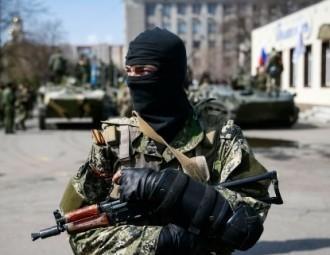Andrei Yahorau: Ukraine is in the state of war with Russia

Ukrainian authorities could have suppressed the gang groups; the indecisiveness of the authorities is only urging the gunmen.
Situation around and inside Ukraine is becoming increasingly tense.
On April 24 during the anti-terror operation several roadblocks were won back. Kremlin has immediately threatened that it will have serious consequences and announced the start of tactical exercises at the Ukrainian border.
Frightened with the threat of military intervention, Ukrainian intelligence services suspended the anti-terror operation, which was resumed by Oleksandr Turchinov several hours later.
On April 29 the Federation Council is to consider a suggestion to introduce Russian army into Ukraine.
Is it a war or Putin is just bluffing?
Andrei Yahorau, the head of the Centre for European Transformation, answered these questions in the talk with the EuroBelarus Information Service.
- Anti-terror operation in Slavyansk has borne its first fruit: Ukrainian intelligence services won over three roadblocks, and according to some information, have killed five gunmen. Kremlin’s reaction to the actions of the Ukrainian authorities was very nervous; it started “tactical exercises” at the Ukrainian border. Does it mean that Moscow is preparing grounds for non-recognition of the president election assigned for May 25?
- Moscow is consistently destabilizing the situation in Ukraine. It is being done through creating conditions in which normal election is impossible.
The success of the anti-terror operation is basically null. Once started, it should have been carried out till the end; otherwise, such actions have very little sense. Ukrainian intelligence services demonstrated that they were able to suppress the gunmen; however, they achieved almost nothing. Such indecisiveness of the authorities is only urging the gunmen. they feel the uncertainty of the law enforcement agencies, feel the protection of Russia and will act even more impudently.
- Will the situation escalate up to the military aggression?
- We cannot exclude such scenario after the Crimea; but Ukraine is already in the state of war with Russia: armed Russian subversives are acting at Ukraine’s territory; Russia has occupied the part of Ukraine… Inertness won’t help there.
I don’t quite understand what the Ukrainian authorities are counting at: that Russia will reject its plans to destabilize the country and to support separatists, or that the gunmen will disappear into thin air?
There are armed people at Ukrainian streets; and it is neither the military men nor militia, which means that these are either terrorists or gangsters. If we do nothing about them, what will the peaceful citizens do, and who will defend them if their own country doesn’t?
- After the threats which were coming from Moscow Ukraine has suspended its anti-terror operation only to resume it several hours after that. Why the Ukrainian authorities are hesitating: is it because they are afraid or because they are dependent in the decision –making processes?
- It can be explained in different ways: the fear of the intervention of the Russian army, lack of agreement in the actions of the law enforcement agencies and politicians, when the latter are constantly interfering… But these are explanations; the Ukrainian situation itself is hard to understand…
- Donetsk regional council has supported the gunmen and favored the decision to grant Russian language the status of the state language, to hold a referendum and to withdraw the law enforcement agencies. Does it mean that the separatism has stepped on a new level of development?
- What’s new about it? The council in Crimea was making similar decisions; but when armed people are all around, I start doubting the legitimacy of such decisions.
- Perhaps, it might be worse to hold a referendum on federalization in Ukraine? And to get rid of burden represented by Donetsk, Lugansk – let them feel the “luxury” of Crimean lives…
- And still, first we should secure the safety of the citizens, to restore law and order, and after that we can, of course, hold a referendum. However, its results are likely to favor the national state of government. According to the data of the Ukrainian polls, federalization is supported by 40 per cent of population in Donetsk and Lugansk; it is quite a lot, but still it doesn’t make the majority of votes. And, besides, the situation now is far from being normal; but if the order is restored, the number of those who support federalization will lessen.
- Which part in the Ukrainian events do you assign to the “Geneva agreements”? Was there a need to make all that fuss because of the paper, which none of the four parties in negotiations didn’t treat seriously?
- Russia didn’t initially plan to fulfill anything, as we understand it now, but it won some time. The anti-terror operation was stopped, the gunmen got a respite, and the situation became even tenser; - exactly what Russia had been looking at.
-
03.01
-
07.10
-
22.09
-
17.08
-
12.08
-
30.09










































